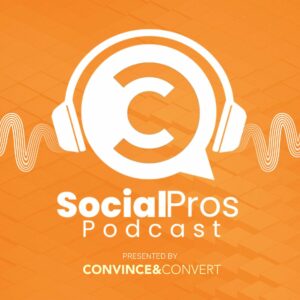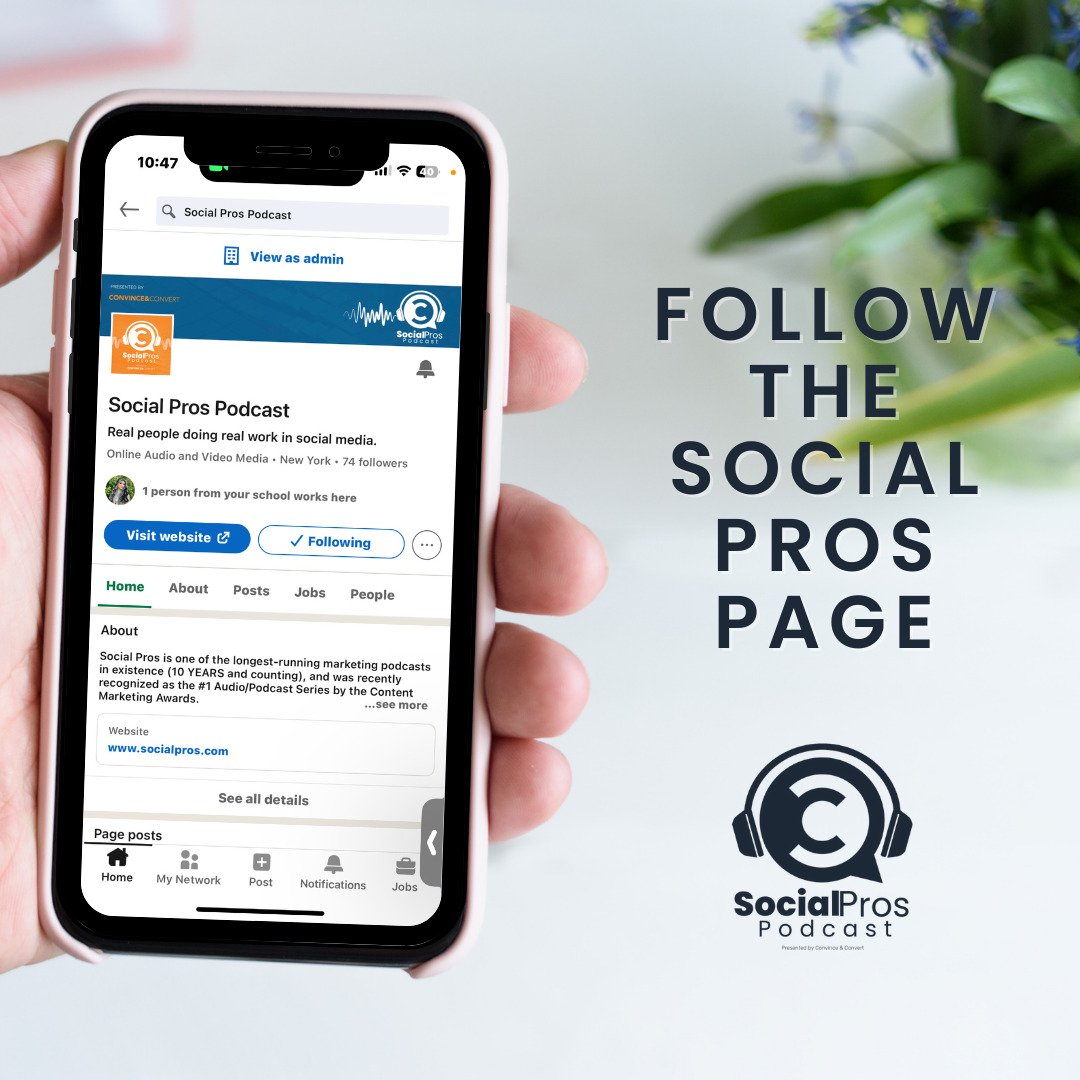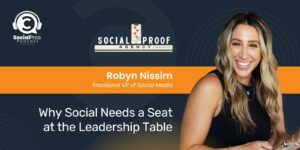Hosted By
About Social Pros Podcast:
Social Pros is one of the longest-running marketing podcasts in existence (10 YEARS and counting), and was recently recognized as the #1 Audio/Podcast Series by the Content Marketing Awards.
Our purpose? Making sure that we speak to real people doing real work in social media.
Listeners get inside stories and behind-the-scenes secrets about how teams at companies like Google, Reddit, Glossier, Zillow, Lyft, Marvel, and dozens more, staff, operate, and measure their social media programs. With 600+ episodes, the Social Pros Podcast brings the humanity of social media to the forefront, while providing incredibly useful marketing strategies that listeners can immediately implement.
Follow Social Pros on LinkedIn.
To inquire about becoming a guest or show sponsor, please email our Executive Producer, Leanna Pham, at leanna@convinceandconvert.com.
Apple Podcast Reviews:
The Social Pros podcast has quickly become a favorite in my feed! I'm consistently impressed by the engaging conversations, insightful content, and actionable ideas. I truly learn something every time I listen!
@Arlie KThis is absolutely an awesome listen for anyone in communications or social media!!
@Will31CThis podcast has become one of my staple weekly podcasts for learning about marketing! Love the conversations that they have and it's always enjoyable and educational!
@Simonstone95Love the podcast - informative, in depth and spot on for any business size.
@MissTriathlon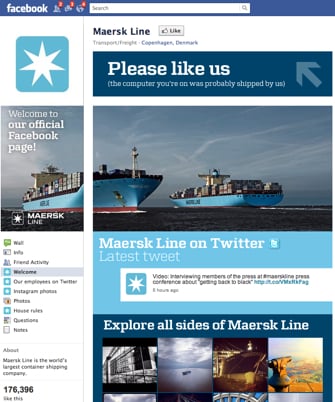
This is Episode 6 of the Social Pros Podcast : Real People Doing Real Work in Social Media. This episode features Jonathan Wichmann the head of social media for Maersk Line, the world’s largest container shipping company. Read on for insights from Jonathan, our “Work It Out” advice segment, and Eric’s Social Media Stat of the Week […]
 This is Episode 6 of the Social Pros Podcast : Real People Doing Real Work in Social Media. This episode features Jonathan Wichmann the head of social media for Maersk Line, the world’s largest container shipping company. Read on for insights from Jonathan, our “Work It Out” advice segment, and Eric’s Social Media Stat of the Week (this week: are we unfriending each other more than ever?).
This is Episode 6 of the Social Pros Podcast : Real People Doing Real Work in Social Media. This episode features Jonathan Wichmann the head of social media for Maersk Line, the world’s largest container shipping company. Read on for insights from Jonathan, our “Work It Out” advice segment, and Eric’s Social Media Stat of the Week (this week: are we unfriending each other more than ever?).
Listen Now
Click the play button to listen here:
[podcast]http://socialpros.podbean.com/mf/play/xnz5ze/SocialProsEpisode6.mp3[/podcast]
Download the audio file: http://socialpros.podbean.com/mf/play/xnz5ze/SocialProsEpisode6.mp3
The RSS feed is: http://feeds.feedburner.com/socialprospodcast
Find us on iTunes: http://itunes.apple.com/us/podcast/convince-convert-blog-social/id499844469
Please Support Our Sponsors
Huge thanks to data-driven social media management software company Argyle Social for their presenting sponsorship, as well as Infusionsoft and Jim Kukral at DigitalBookLaunch. We use Argyle Social for our social engagement; we use Infusionsoft for our email; and Jim is our guest host for the podcast and a smart guy).
Social Pros Transcript For Your Reading Enjoyment
Transcription services provided by:
![]()
Jay: And we are back with a Social Pros #6. I am Jay Baer joined, as always, by my trusty sidekick Eric Boggs. Eric, how are you?
Eric: I’m just great, Jay. The pre-South by Southwest episode should be a good one.
Jay: Absolutely. Did you miss me last week?
Eric: I did. I did. Jim Kukral’s a pretty good cat, though.
Jay: He is a good guy and we appreciate his support and for him stepping into the breach when I am away. I do appreciate you guys ganging up on me in my absence last week so I have to watch and listen when I’m gone. People will stab me right in the back.
So we’ve got a great show today and, as you said, South by Southwest is coming up in just a few days. You and I will be palling around out there in Austin, trying to get some live audio from our compadres at South By so that should be a good time. In between tacos and beer, we will try to get some Social Pros audio while we’re out there.
Eric: Yeah. Take a look for us. I’ll be the guy with the argyle pants toting around a microphone so it shouldn’t be hard to miss me.
Jay: It should not be hard to miss Eric Boggs.
Eric: Also standing beside Jay Baer so there’ll be a massive entourage of cool people too.

Jay:Yeah, that’s exactly what happens. That doesn’t even happen in my own house, much less at South by Southwest. We should include a photo of you in your pants again in the blog post so that people can identify you by your pants. In addition to Eric’s fine company, Argyle Social, which we use at Convince & Convert for all of our social media needs, other sponsors for this fine program are our friends at Infusionsoft and we’ll be at a little party for them on Friday at South by Southwest and, of course, Jim Kukral himself at Digital Book Launch helps to sponsor the Social Pros podcast as well.
Today, on the show, in just a moment, Jonathan Wichmann from the Maersk Line, which is the world’s largest container shipping company. If you have ever seen a container vessel or a train or maybe a long-haul trucking operation in this great land of ours, you have seen Jonathan’s company. He’s going to tell us just how many goods they import and move around this world. You think, “Gee, why do we have a container shipping company on the Social Pros podcast?” You are going to be blown away when you understand just how good these guys are at social. So if you’re out there thinking, “Geez, my company is boring. I make ball bearings. I’m B-to-B. I can’t do social media.” Bull! We’re going to show you how you can for a company that most people would not think is inherently social media-oriented.
Eric: Also, our first international guest, if I’m not mistaken.
Jay: That’s right. Jonathan is going to join us from Copenhagen, I believe, is where he is today and I think that’s where his primary home base is. One of my favorite cities in the world and I’m not just saying that because I’m a quarter Danish, although it doesn’t hurt.
Jay’s Thought of the Week
So let me talk about my thought of the week. My thought of the week is all about this new Facebook thing. I wrote a blog post today called, “Fourteen Ways that New Facebook Betrays Small Business,” and I feel like everything they announced last week is pretty nifty if you’re a larger company that has a staff and some social media consultants at your disposal. But if you are a local mom & pop dry cleaner, restaurant, baby-sitting service, etc., I think many, if not most, of the changes they have announced are going to be burdensome. It requires some additional management of your Facebook presence as well as some additional aptitude with photos and uploading and things like that.
Ultimately, that bothers me. I feel like Facebook is making the classic mistake of, “Hey, we need additional dollars so let’s cozy up to the Fortune 500,” and not realizing that there’s a lot more small businesses than there are big businesses and that’s why I feel like Google has always gotten it right in that regard, if nothing else, in that all the things that they’ve done with AdWords and Optimizer and Analytics and all these other things are very small-business friendly. I think, long- term, that’s a smart play.
Eric: Yeah. I think you are on point there in terms of Google’s ability to capture the long tail in terms of the smaller advertisers. I’ll tell you, my perspective on a lot of the Facebook changes. I think most of them are actually good but I agree, it does add so much overhead even in terms of just finding the cover picture for your page. It took me probably an hour to find a high-res photo that we had hanging around Argyle to put on our Facebook page and I can only imagine . . . my Mom is actually a marketing consultant and she does social for a lot of local businesses and they’re not going to be able to put this together very quickly and easily and it’s going to be painful. So for people like my Mom, who make their money helping businesses do this, it’s a boon, but for the businesses themselves, I think it’s just going to create a lot of complexity that they’re just not going to find as rewarding.
Jay: Yeah and, as you said, it’s going to take some time to put this together and for small businesses, they’re not sitting around thinking, “Geez, I’ve got a few extra hours a week, let me dive into doing Facebook more aggressively.” My favorite part of this whole thing was Facebook literally patting themselves on the back for giving people 30 days notice, as if that is some extraordinary gesture. I’m like, “Thirty days?” For a small business, that is not very much time to get this figured out.
Eric: Seriously. Well what do you think about the changes to the ad units? I mean, that really gets back to the conversation we had on an earlier podcast episode where we talked about the ability to target organic content and that’s effectively exactly what Facebook has built. You just have to pay to do it.
Jay: Right. Yeah. Their targeting capabilities far supersede anything else available on the Internet in almost any way shape or form but what I think that they’ve said is, “Look, we can only monetize that to a certain degree going with primarily direct- response-oriented advertising,” is what they’ve been involved in so far with marketplace ads. A lot of people have bought Facebook ads on a cost-per-click basis so now they’re saying, “You know what? Let’s change this game a little bit and orient these advertising opportunities more towards bigger brands who are going to pay us on a cost-per-impression basis longer term, bigger dollar deals and it certainly makes sense for Facebook but there’s going to be less advertising inventory available for the small guys who will prefer, obviously, to buy stuff on a cost-per-click basis.
Eric: Yeah.
Jay: So we will see what happens. It will be interesting on March 30th to hear the collective disturbance in the force when everybody turns on their Timeline and it’s all jacked up.
Eric: Yeah, it’s a lot of work, you’re right. I’m trying to think about when I activated timeline on my personal page and Facebook did a pretty good job of guessing when I was born and when I was married and the things like that that I had already structured based on my usage of the platform. Businesses have none of that. I guess you have like the date you started your business if you put that in your company page but all the other milestones and things that sort of align with the timeline paradigm, they don’t exist for the most part, I would guess, in a typical brand’s page. So it’s going to be a ton of work to go back and sort of back fill all of that.
Jay: And I agree with you. I think that ultimately it’s for the best because it forces companies of all sizes to be less overtly promotional. As Facebook has said, they want businesses to act like people and they’re sort of legislating that to be true based on how they’ve reconfigured the technology. So I think, ultimately, from sort of a spiritual perspective, it makes a lot of sense in terms of how businesses use Facebook and to protect them from themselves, to some degree, but it is going to be a hassle for a lot of small companies and they’re just going to have to either say, “Hey, we’re going to find a way to make time or we’re going to get off of Facebook,” so we’ll see how that shakes out.
Eric: Yeah, yeah.
Eric’s Social Media Stat of the Week: 71% of Execs Say Taking Social Media Seriously Gives Them a Competitive Advantage
Jay: Tell us, good sir, if we have a social media stat of the week. This has been a good week for social media stats, all kinds of stuff. What is this week’s social media stat of the week, Eric?
Eric: There have been plenty to choose from. This week, we’re going to talk a bit about a forth-coming report from Forrester Research. Forrester’s consulting division did a survey of over 100 V.P. and C. level professionals, including 12 CEOs, CMOs, VPs, you kind of get the whole deal. Facebook actually commissioned this report. The full manifesto will hit later this week. So look for it on Wednesday, I think. A few interesting data nuggets: 41% of those surveyed have begun to use social media marketing to promote their products, manage their staff, optimize their operations; 76% of those sort of viewed social media as a brand- builder for their organization; 40% plan to start employing social media as a marketing operations tool. So those that have not adopted it plan to. What I find interesting and appealing about all of this is that a survey was conducted of VPs and C- level marketing professionals and they had some intelligent things to say about social media. They had visibility to social media marketing as a mechanism to move their businesses forward.
Jay: Yeah, I found it interesting how much people were using social or thinking about social as an awareness builder.
Eric: Yeah. Well, one other data nugget I didn’t mention, 71% say that companies taking social media seriously gain a competitive advantage. Actually, I probably should have led with that one. But, yeah, it’s kind of a curious thing to see what this survey might look like two years from now versus what the survey might have looked like two years ago.
Just goes to show that the market’s moving quickly. But this idea that executives are starting to think about social media as mission-critical in terms of a way to gain a competitive advantage or a way to not sort of wither on the vine, I think is a pretty compelling story.
Jay: Yeah. It’s good job security for you.
Eric: And you.
Jay: Yes, so they tell us and everybody else who is a social pro, right?
Eric: Exactly, exactly.
Jay: Hence the name of the podcast. Let’s talk to today’s very special guest, Jonathan Wichmann from the Maersk Line, which as I mentioned in the intro, is the world’s largest container shipping company. Jonathan, thanks very much for being here.
Special Guest: Jonathan Wichmann, Maersk Line
Jonathan: Thank you for having me here. It’s a big honor.
Jay: Well, it is not a big honor at all but we appreciate you saying so. Thank you very much.
Jonathan: It is a big honor and you are quite right, I’m situated in Copenhagen, Denmark so I guess I’m the first international guest.
Jay: You are. You are very much and hopefully you will not be the last international guest after the European community gets word of the Social Pros podcast. When we were doing some research for this, and you and I have interacted a couple times in the past, Jonathan, it is absolutely amazing to me the number of things that your company has going on in social. Could you maybe give the listeners just a little bit of a sense of how Maersk Line works and sort of how that container shipping business rolls out and who your actual customers are and then some of the things that you’re involved in social media?
Jonathan: Well, the container shipping business is a, in a way, an old business, conservative business you might even say. It’s been around for more than 100 years and the company has a rich heritage of very strong stories to tell. But as it is, kind of, I wouldn’t say a secret business but not very public and not living very much from sharing the stories, at least in the past. It’s been quite a change to jump into the whole social media sphere for Maersk Line. I believe that’s the first company in that industry and it’s been equally overwhelming to see the response from the outside world and I don’t think anyone in the company anticipated that it would reach these heights so soon. Basically, we decided, and we’ve only been there for four months . . .
Jay: Is that right? Wow!

Jonathan: That is right. I joined on the first of October last year and I was hired to do this and I’ve been driving it by myself, actually, part-time. So it’s a rather small set-up, a lean set- up we do.
Jay: But here’s the thing, right, you’ve been doing this for four months, you’re the only guy doing it. You started it. You are a container shipping company, let me just make sure people realize that. You have 174,000 fans on Facebook.
Jonathan: Yeah. It’s really taken off. There are a lot of good things. It is a global company. It is 110,000 or 120,000 employees. It’s truly global in the sense as a network and all the countries. The Maersk brand is really strong so that’s a big advantage, of course, when you start out. Then there are a lot of very different kind of users that find it interesting to interact with us, the employees of course, there’s the whole shipping community, and then there’s the customers. That was really the whole idea behind, that was what convinced the company to, “Okay. Let’s do this now,” because before I came, they had been in what they termed “the listening phase” for three years . . .
Jay: That’s a long phase.
Jonathan: Yeah. Just listening to what and how can we be anything in this social world. So the whole plan is to, the whole strategy is to get closer to our customers, that’s how we defined it. But really there are so many other aspects of it as well. But in terms of employer branding and the brand loyalty and creating awareness and driving the agenda in the container shipping industry. One of the good things, for Maersk Line in terms of this is we’re really ambitious in terms of changing or shaping the shipping industry, driving the innovation because right now it’s not as profitable as it should be so things has to change and social media could be one of the ways to actually learn how we could go about it because we don’t necessarily, in Copenhagen, know what’s the best thing to do. All the good ideas might be out there. It’s also about connecting and bringing in some intelligence from influentials in the industry.
Eric: Jonathan, how do you think about socializing a brand as big and international and traditional as Maersk Line?
Jonathan: Yeah, that is really the attraction of my job, I think, because social media and Maersk, that is not something that meshed, so it came as a surprise to people and all of the sudden it can work out. It can be social. One of the things we did was, in the pattern I work in, it works rather close to a, like the senior people, the executives and so on, so we’ve managed to get some of them on both our Twitter feed and on Facebook where they tweet about what’s up and down in their world. That’s, of course, a way of engaging people upwards in the company. You can show that it’s not just another add-on. It goes right through the center of the company, or should at least. It’s still a learning phase, I would say. We’re just getting started. Because the front-line people, all the many young, enthusiastic guys and girls around the world, they jump right into it and they just started sharing team photos and whatever with us and we started posting those as well.
Eric: Yeah, that was actually the next thing that I was going to ask you. Some of the photos are beautiful. Are they all sourced from your team?
Jonathan: The team’s photos you’re talking about? You’re talking about vessel photos?
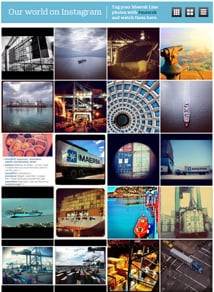 Eric: Yeah, on your Facebook page and on Instagram.
Eric: Yeah, on your Facebook page and on Instagram.
Jonathan: Yeah, on the Instagram, we have, of course, a library of 14,000 photos. That was like the first thing I did when I started was to go down into the basement, into the archives and get a hold of some of these really, really amazing photos from the past and current, new photos as well. But on Instagram, the whole idea is to get container or ship tagging going and we can see that has started to happen, that people in terminals or on the ships, in the streets or the cities, when they see a Maersk container, they take a photo with a mobile phone and then they hashtag it “Maersk” and then it automatically feeds into our Facebook page. So there are many kinds of engagement or interest around the brand. This is a very visual site.
Jay: One of the other things that I really like about your Facebook page is the “house rules” section, very much a best practice. Very few companies actually do it but on your Facebook page you have a tab that says, “Obviously, we’re around the world but we’re doing this in English and here’s kind of how we handle customer service and you can’t do things that are offensive,” and it basically sets forth the ground rules for how you’re going to manage your Facebook page. Really, really excellent idea. Did you use a social media management software tool to create that page or did you just build it on the fly?
Jonathan: We just built it on the fly right from the start because we realized that customer service, you know, if we start inviting them into the game, then it’ll never end and we need a whole team of 50 people sitting there.
Eric: Probably more than 50.
Jonathan: More than that, even. We already have some on-line tools that people can use instead so we’re rather direct them to those than trying to handle them on social media. So we have a very focused approach to it. Yeah, as I said, getting closer to our customers but also bringing in some intelligence from the outside world. For example, we did on LinkedIn, we’ve done this closed group of influentials in the industry, the shipping circle, it’s called, where we ask questions like, “What’s the next big innovation that will turn the industry upside down?” and people write amazing pieces, really insightful stuff. I will then involve the management team and see if there’s something there that they can pick up in their decision-making.
Jay: So as leaders in the industry, your company is facilitating conversation about key topics in the industry?
Jonathan: Yeah.
Jay: Fantastic.
Jonathan: That is the whole point.
Jay: As I mentioned earlier, you’ve got 174,000 Facebook fans, in fact, 10 more since we started the podcast, even though the podcast isn’t live, so that’s good news, but substantially fewer, just a few thousand on Twitter. Was that a design to sort of channel emphasis issue or just sort of how it happened to roll out?
Jonathan: It was quite deliberate that we started on Facebook because, in terms of volume, that is, next to Google, where people enter the journey on the Internet as of right now. That’s how I look at it at least. If you know what you’re looking for, you go to Google. If you don’t know, you go to Facebook. It might be different in the United States but in Europe, I think, and especially in Asia, that’s how it is today. So that was quite deliberate. Then that is the idea to create volume and awareness through Facebook and I think Twitter is more for sharing news and trying to even influence the press and the other bloggers and stuff like that.
Jay: Well and certainly given how photo-driven a lot of your social communication is, Twitter makes that a little more difficult. Obviously you could link to your photos and it’ll show up in your little photo area on Twitter but certainly Facebook and even Google+ would be better places if you’re going to have a heavy photography play. You have a Tumblr blog as well that contains your Instagram feed, is that right?
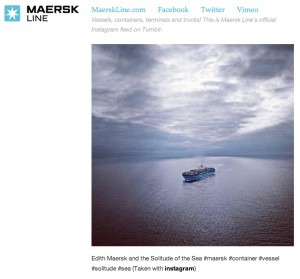
Jonathan: Yeah, that’s right. We just keep that nice and clean, only the Instagram photos and nothing but that. So it’s for all those without an iPhone, basically, so they can be part of it as well. We were quite latecomers on Facebook, as you can tell, so the idea with Instagram was basically to say, “Okay. Even though we’re late here, we might be first movers in other areas.”
Jay: Fantastic. Well, hey, there’s a lot of companies that would like to be late to the game and put up 174,000 Facebook fans in four months for a container shipping company so I think you’ve got an awful lot to be proud of. It’s a fascinating, fascinating program.
Jonathan: Thanks. Thanks a lot.
Eric: Agreed, yeah. It’s very cool, Jonathan.
Work It Out
Jay: Speaking of photos, today’s “work it out” segment comes from Phil, a Social Pros listener who asked about Pinterest. We talked about Pinterest at one point on the show and he wants to know whether or not it makes sense for his particular business. Phil’s an interior designer. It would seem that Pinterest is on everybody’s lips but it’s not for everybody, right, Eric?
Eric: It is indeed. I wrote an article today about Pinterest. This is probably not where you’re going or where Phil wants to go with this question, but about copyright issues with some photos earlier today. Anyway, that kind of popped in my head randomly but, yeah, Pinterest, it’s a kind of a wait and see game, I think, for most. But if you’re an interior designer though? It seems like bread and butter, I would think.
Jay: Yeah and I think for companies, I think you raise a good question about copyright. Jonathan just mentioned that he has this entire basement full of 100 year-old Maersk Line photos that he can cull through and post to the Internet because they presumably have rights to those photos and have this amazing legacy of the company and putting those on Pinterest in a way that is interesting, I think, makes perfect sense.
But what has happened now is that a lot of people go out and just pin a lot of images that you don’t have rights to maybe even the site you pinned it from doesn’t have rights to it. So people who were actually the original photographers of that image are starting to say, “Hey, wait a second! What happened to my link and my credit and my licensing,” and all those other kinds of things so it’s going to be interesting to see how that shakes out.
We’re very much getting into yet another micro-era of niche networks, of people saying, “Well maybe it’s not just Facebook and Twitter and LinkedIn and YouTube. Maybe we should get into Pinterest or Path or whatever else is going to float through the transom.” To some degree I can see the attraction there. On the other side, I think people need to worry about doing what we have today better more so than doing the new thing.
Eric: Yeah. Jonathan, you do a pretty good job of blending a mainstream network like Facebook with a smaller network like Instagram. Are you guys sort of purposeful in that or what even makes you adopt Instagram when there’s a perfectly functional photos function inside of Facebook?
Jonathan: I think the thing that the Instagram community is quite different from Facebook and from Twitter and it is interesting to . . . I just find it interesting, actually, to go out there and see happens on various challenges. I think the small set-up that we have, especially in the start-up phase, is very important so you don’t get caught up and be measurements and KPIs and all that, which can happen at big companies because then you can experiment a bit, try out some stuff and maybe you find out, “Oh, it doesn’t really work for me.” On Google+, for example, I couldn’t really see, for example, how it would work for us but maybe I haven’t experienced it at all yet so it’s just about going out then and seeing what happens.
Jay: It’s a good point you raise about not measuring it to death. Eric and I both come from a measurement background and tend to be as strategic as possible about social participation but I think, especially in big companies, you’re right that sometimes you can put so much math around it that it kills your ability to experiment and I think it’s actually really commendable that you’ve been able to go as far as you have as quickly as you have with Maersk Line without getting bogged down in a lot of analysis and reporting so far.
Jonathan: And I think really, the whole thing is that the social media, is it a business logic or it is a social logic? Because if it’s a social logic, then measurements are no good really. You need to measure it in a qualitative way in order for it to make sense. Let’s just say, “Okay. We have 170,000 fans on Facebook. That’s not a success as such.” So I really think we need to look at other ways of measuring what’s good and what’s not good, to put it that way. So I’m not all for all the metrics in the start- up phases at least. Especially when you talk B-to-B companies, there is quite a long way to an actual sale, of course, so that makes it even less relevant.
Jay: This has been fantastic, a fascinating episode, one of my favorite so far for sure. Jonathan, you’ve been great. Thank you so much for taking the time. I know it’s late at your place. Eric, thank you as always. Thanks again to our sponsors: Eric’s fine company, Argyle Social, Infusionsoft, our buddy Jim Kukral. Next week, we will be back with some sort of South by Southwest show. We’re not even sure who we’re going to be able to corral yet. Week after that, Ian Greenleigh from Bazaarvoice is going to be our guest so we’ve got all kinds of amazing things coming up on Social Pros and we thank you for your support.
